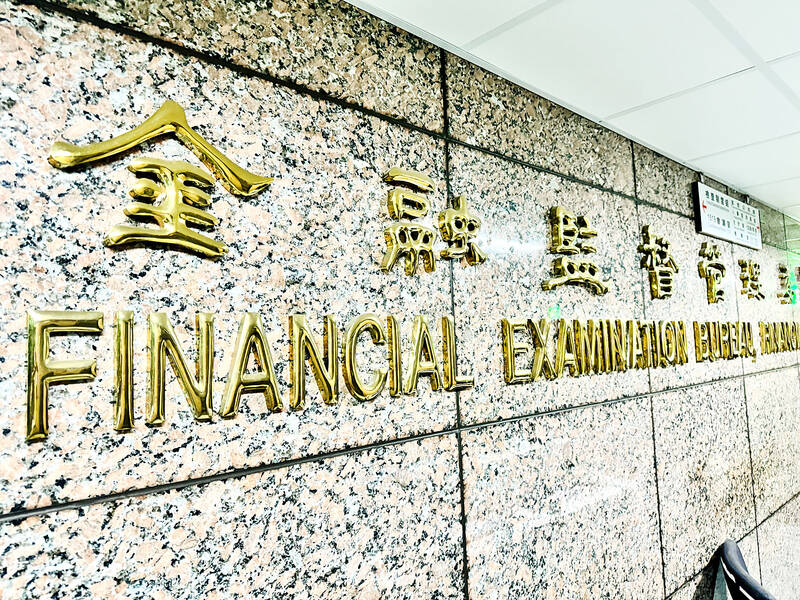Offshore operations of the local financial sector reported a more than 14 percent fall in pretax profits from a year earlier in the first seven months of the year, as high US dollar interest rates boosted their costs, the Financial Supervisory Commission (FSC) said last week.
The combined pretax profits of offshore banking units (OBUs), offshore insurance units (OIUs) and offshore securities units (OSUs) totaled US$989 million, down 14.5 percent from a year earlier, data compiled by the commission showed.
Pretax profits posted by OBUs totaled NT$32.12 billion (US$1 billion), down 12.6 percent from a year earlier, the commission said.

Photo: Kelson Wang, Taipei Times
After an aggressive rate hike cycle by the US Federal Reserve last year, interest levels in US dollar-denominated assets have stayed high, which pushed up costs of interbank lending shouldered by OBUs, Banking Bureau Deputy Director-General Phil Tung (童政彰) said.
In the first seven months, the balance of deposits received by OBUs rose to NT$3.67 trillion, up 2.9 percent from a year earlier, and the balance of lending totaled about NT$2.40 trillion, up 7 percent year-on-year with the average deposit-to-lending ratio at 65.3 percent, the commission said.
However, the highest interest income due to a rate hike cycle in the US allowed OIUs to increase their interest income, Insurance Bureau Deputy Director-General Tsai Huo-yen (蔡火炎) said.
The combined pretax profits of OIUs was US$16 million, representing a 10.6-fold increase from a year earlier at a time when OIUs of life insurance companies, non-life insurance firms and re-insurers saw their profitability continue to improve, the commission said.
The increase also came from a relatively low comparison base last year as insurance companies had to pay massive compensation to insurance policyholders due to climate change, Tsai said.
However, the number of insurance contracts sold by OIUs in the first seven months fell 18.1 percent year-on-year to 416, with premium income plunging 87.9 percent to US$3 million, the commission said.
The sharp drop in the number of new contracts and premium income reflected caution among OIUs which appeared reluctant to sign a large number of new contracts after paying huge compensation last year, Tsai said.
Many OIU clients terminated their contracts ahead of schedule or declined to renew their contracts, Tsai said.
Combined pretax losses for OSUs were less than US$3 million, down almost US$10 million from a year earlier, the commission said.
The improvement showed many securities firms parked their funds in bonds commanding higher yields after their previous bond investments matured, Securities and Futures Bureau Deputy Director Kao Ching-ping (高晶萍) said.

Taiwan will prioritize the development of silicon photonics by taking advantage of its strength in the semiconductor industry to build another shield to protect the local economy, National Development Council (NDC) Minister Paul Liu (劉鏡清) said yesterday. Speaking at a meeting of the legislature’s Economics Committee, Liu said Taiwan already has the artificial intelligence (AI) industry as a shield, after the semiconductor industry, to safeguard the country, and is looking at new unique fields to build more economic shields. While Taiwan will further strengthen its existing shields, over the longer term, the country is determined to focus on such potential segments as

UNCERTAINTY: Innolux activated a stringent supply chain management mechanism, as it did during the COVID-19 pandemic, to ensure optimal inventory levels for customers Flat-panel display makers AUO Corp (友達) and Innolux Corp (群創) yesterday said that about 12 to 20 percent of their display business is at risk of potential US tariffs and that they would relocate production or shipment destinations to mitigate the levies’ effects. US tariffs would have a direct impact of US$200 million on AUO’s revenue, company chairman Paul Peng (彭雙浪) told reporters on the sidelines of the Touch Taiwan trade show in Taipei yesterday. That would make up about 12 percent of the company’s overall revenue. To cope with the tariff uncertainty, AUO plans to allocate its production to manufacturing facilities in

COLLABORATION: Given Taiwan’s key position in global supply chains, the US firm is discussing strategies with local partners and clients to deal with global uncertainties Advanced Micro Devices Inc (AMD) yesterday said it is meeting with local ecosystem partners, including Taiwan Semiconductor Manufacturing Co (TSMC, 台積電), to discuss strategies, including long-term manufacturing, to navigate uncertainties such as US tariffs, as Taiwan occupies an important position in global supply chains. AMD chief executive officer Lisa Su (蘇姿丰) told reporters that Taiwan is an important part of the chip designer’s ecosystem and she is discussing with partners and customers in Taiwan to forge strong collaborations on different areas during this critical period. AMD has just become the first artificial-intelligence (AI) server chip customer of TSMC to utilize its advanced

Chizuko Kimura has become the first female sushi chef in the world to win a Michelin star, fulfilling a promise she made to her dying husband to continue his legacy. The 54-year-old Japanese chef regained the Michelin star her late husband, Shunei Kimura, won three years ago for their Sushi Shunei restaurant in Paris. For Shunei Kimura, the star was a dream come true. However, the joy was short-lived. He died from cancer just three months later in June 2022. He was 65. The following year, the restaurant in the heart of Montmartre lost its star rating. Chizuko Kimura insisted that the new star is still down